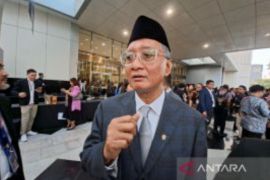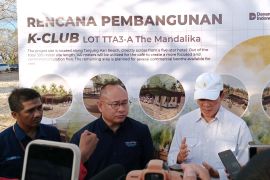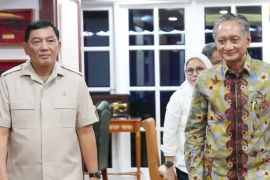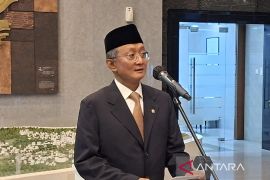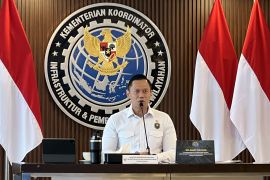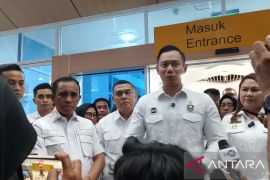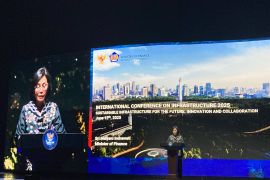"The capital expenditure allocation for infrastructure must be used effectively. The infrastructures that we build must have economic functions," economic observer Enny Sri Hartati of the Indef said.
Enny made the statement in response to an increased budget of Rp168.1 trillion allocated for infrastructure development in the 2012 draft state budget President Susilo Bambang Yudhoyono unveiled on Tuesday.
The amounts of budget for infrastructure have continued to increase every year but the use of the funds for development and maintenance of infrastructures was still low.
The absorption of the funds so far was not yet running effectively because the government tended to build and reconstruct physical facilities such as government buildings which had no economic functions.
"Infrastructure expenditures must be used mainly to eliminate bottlenecks and improve connectivity between cities and villages, food resilience and people`s prosperity," she said.
In his state-of-the-nation address before the parliament on Tuesday President Susilo Bambang Yudhoyono said the government had set Rp168.1 trillion capital expenditure in the 2012 Draft State Budget for the development of infrastructure, including energy, food resilience and communications infrastructure.
"We design the increase in the capital expenditure for supporting infrastructure development, including energy, food resilience and communications infrastructure," the President said.
He said that infrastructure expenditures must be increased in order to overcome bottleneck in infrastructure and develop domestic inter-connectivity, food resilience, energy resilience and people`s prosperity.
Infrastructure is one of the nine main targets of the state expenditures the president mentioned in his state address. For this, the president has promised to increase expenditure budget on infrastructure.
"We will aim expenditures at achieving nine main targets namely expenditure on infrastructure," President Yudhoyono said.
He said, in the 2012 Draft Stage Budget, the allocation of capital expenditure for infrastructure was set at Rp168.1 trillion, up Rp27.2 trillion or 19.3 percent from the 2011 revised state budget.
Budget for infrastructure has continued to increase every year. In 2010, the budget for it was set at Rp108 trillion, and it was increased to Rp140.9 trillion in the 2011 revised state budget.
According to President Yudhoyono the budget for infrastructure in 2012 amounting to Rp168.1 trillion will be used to develop various infrastructure projects such as railways, airports, roads and bridges.
With that budget, the government is planning to increase the country`s inter-regional connectivity so that the capital expenditure was planned among others to build railways networks with a total length of 150 km, rehabilitate 116 airports, build 14 new airports in various places in the country.
"We will keep a balance in the development of even infrastructure in various parts of Indonesia," the president said.
In order to overcome infrastructure`s bottleneck and increase the inter-regional connectivity, the government is planning to use the capital expenditure budget to upgrade and construct new roads with a combined total length of 4,005 km.
Besides, the government would repair, preserve and maintain 36,319 km of roads, build 7,682 meters of new bridges while maintaining 217,076 meters of bridges throughout the country.
According to Finance Minister Agus Martowardojo, investment in the infrastructural sector in the 2010 - 2014 period is estimated at Rp1,400 trillion. However, the government is only able to finance 30 percent of the needed investment.
The government will accelerate the realization of as part of its efforts to integrate the country`s six economic growth corridors, to offset inflation and boost finished goods exports.
If the best scenario is implemented, the Indonesian economy could grow by 7.1 percent to 7.6 percent during the 2011 - 2014 periods. It even has the potential to reach 8 percent in accordance with expectation if infrastructure is improved.
"If the participation of the private sector in the development of infrastructure could reach 50 percent of the needed investment, and the government increases its spending for transportation infrastructure to 20 percent, the matter (8 percent growth) could be reached," Fauzi Ichsan, senior economist of Standard Chartered Bank, said recently.
He said that toll roads, electricity plants and ports were among the infrastructure facilities that needed to be improved. After all, the development of infrastructure in the last decade had run very slowly and depended on the government budget.
In this case, the government hoped that the private sector is expected to take part in the development of infrastructure.
According to Vice Minister for Financial Affairs Anny Ratnawati investment in the infrastructure sector would be carried out through a partnership program. "Investment in the infrastructure sector would be carried out through a government-private sector partnership program," the vice minister said once said. (*)
Reporter: By Andi Abdussalam
Editor: Kunto Wibisono
Copyright © ANTARA 2011

